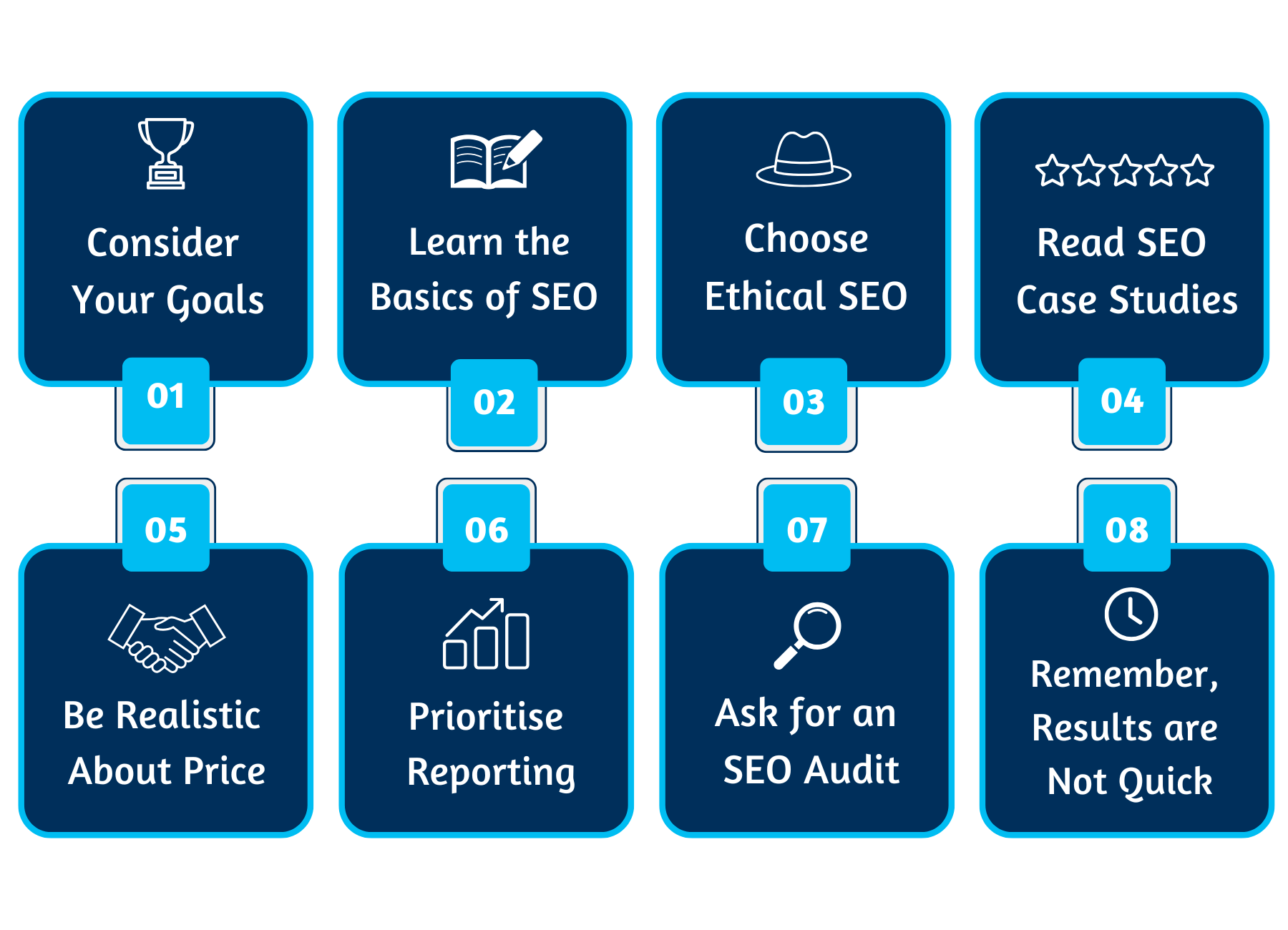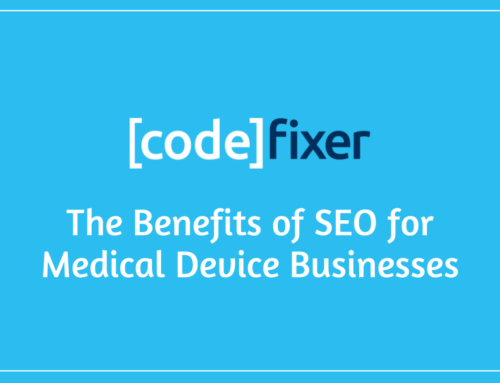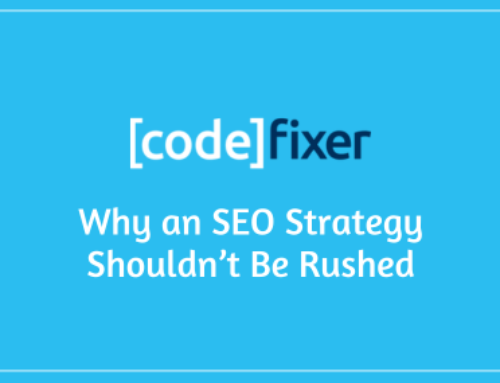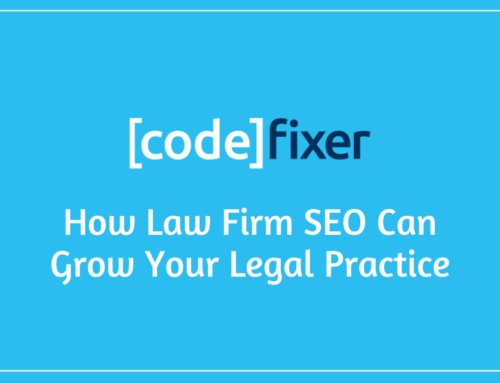SEO often gets a bad reputation, and it’s easy to see why. The results can take time, measuring ROI can be difficult, and many underperforming agencies hide behind these reasons, often making false promises at low fees and failing to deliver. Understandably, this leads to frustration and mistrust, especially if you’ve been burned by a previous SEO agency.
But not all SEO agencies are alike. Many seasoned professionals genuinely know how to drive results and, importantly, be able to prove it. This guide will help you figure out how to choose an SEO agency that’s right for your business. We’re here to offer unbiased advice to help you ask the right questions and find a reliable SEO partner to help your business grow.
8 Steps for Choosing the Right SEO Agency
Choosing the right SEO agency can be daunting, especially after a less-than-ideal experience. These eight steps will guide you in choosing the right SEO agency to help you deliver real, sustainable results.

Step 1. Consider Your Business Goals
Before you even start searching for an SEO agency, first nail down your business goals. Do you want to generate a certain amount of revenue or leads? Do you want to establish your business as a topical authority in your industry? Understanding your objectives will help you filter out agencies that don’t align with your business goals and values.
Here are a few examples of how SEO can help your business:
- Increase website traffic: If your goal is to reach more customers, SEO can drive organic traffic to your site through optimised content and better search rankings.
- Generate more leads: SEO can help attract users actively searching for products or services like yours, increasing the potential for lead generation.
- Improve brand visibility: By targeting specific keywords related to your business, SEO can raise brand awareness and make your business more visible to potential customers.
- Boost sales: With a strong SEO strategy, your website can rank higher for transactional keywords, leading to increased conversions and sales.
- Enhance user experience: SEO focuses on boosting site performance, load times, and mobile-friendliness to improve customer experience.
Step 2. Get a Grasp of SEO Basics
Once you’ve narrowed down your business goals, the next best step is to understand the foundations of SEO. While you don’t need to be an expert, getting some SEO training will help you evaluate potential agencies more effectively. It will also help you more clearly communicate your goals to the agency, preventing miscommunication.
Here are the four pillars of SEO that a strong agency will focus on to create a well-rounded strategy:
- On-Page SEO: This involves optimising elements on your website, such as meta tags, headings, and content, to make it easier for search engines to interpret and rank your pages.
- Technical SEO: This focuses on improving your website’s technical aspects, such as site speed and URL structure, so your site is accessible and can be crawled by search engines.
- SEO Content: Creating high-quality, relevant content that addresses user intent and incorporates targeted keywords will engage your audience, helping it to rank higher.
- Off-Page SEO: This includes building backlinks (links from other sites to yours), increasing social signals, and improving online reputation, which helps establish your site’s authority and trustworthiness in search engines.
Step 3. Choose an Ethical SEO Company
SEO can be split into white hat SEO (approved, ethical techniques), grey hat SEO (risky methods), and black hat SEO (unapproved, harmful tactics). Though black hat SEO tactics can often deliver quick results, Google is quick to punish sites that use them. An ethical agency will follow best practices that meet search engine guidelines, avoiding shady tactics that could harm your site.
Here are some ways to determine if an SEO agency is ethical and only uses white hat tactics:
- Clear communication: A trustworthy agency will openly share its strategies and not promise unrealistic outcomes or rankings.
- Focus on quality content: They will prioritise creating high-quality, useful content rather than stuffing it with irrelevant keywords.
- Ethical link-building: They will acquire backlinks through legitimate means, such as trustworthy link vendors and outreach, rather than purchasing cheap links from low-quality sources.
- Honest practices: They will avoid tactics such as cloaking, hidden text, or doorway pages (misleading links) that try to trick search engines.
- Commitment to user experience: The agency will work to improve your site’s usability, performance, and mobile optimisation to create a seamless experience for users.
Step 4. Check Out SEO Case Studies
Reviewing an SEO agency’s case studies or portfolio allows you to assess their ability to deliver real, measurable results. Case studies demonstrate how the agency has tackled challenges in previous projects and provide you with insights into their approach, strategies, and success rates. When reviewing case studies, look for evidence of improvements in the desired areas of your business goals, e.g., lead generation or website revenue.
For example, using our previous case studies, we’ve helped:
- A private healthcare clinic increase their contact form submission by 324.81% over a 6-month period.
- A leading local law firm improve their local presence, ranking them in the top 3 positions for over 50+ local keywords.
- A home-heating e-commerce website increase its organic revenue by hundreds of thousands of pounds year-over-year.
Step 5. Read SEO Client Reviews
Reviews provide a genuine insight into an agency’s reputation, customer satisfaction, and ability to deliver on promises. They give firsthand accounts from businesses that have worked with the agency, helping you gauge their professionalism and effectiveness.
For example, one of our clients, a bathroom supplier, shared:
“After a thorough evaluation of various digital marketing agencies, we decided to partner with Codefixer, and we’ve been incredibly impressed with the results. Over the past year, our conversions have seen a significant increase, thanks to their expert strategies and dedicated team”
Here are three ways to find genuine reviews from SEO agencies:
- Google Business: Look at the agency’s Google Business profile reviews for honest client feedback. The reviews there are typically unbiased and often provide detailed insights. Even if they aren’t all 5-star reviews, look for the agency’s response to negative comments. How they respond will tell you how the agency resolves issues or disputes.
- Third-Party Websites: Review sites like Trustpilot and Clutch for your prospective agency. These sites have no affiliations and will help you understand the agency’s past work and customer service.
- Social Media Engagement: Check the agency’s social media platforms to see how they engage with clients and what feedback is shared publicly. Positive interactions can be a good indicator of their service quality.
Step 6. Be Realistic About SEO Agency Pricing

SEO can be difficult to prove its return on investment, which is why some poor-performing SEO agencies manage to deceive clients into costly fees for little to no results.
However, businesses need to understand that great results don’t come cheap. While low-cost options may seem appealing, they often come with compromised strategies that could hurt your website in the long run. Investing in competitively priced, high-quality SEO can lead to better results over time, as more experienced agencies personalise tailored strategies to help achieve your business goals.
Here are some actionable ways to set realistic expectations about costs and avoid the pitfalls of choosing the cheapest option:
- Compare pricing across agencies: Understand the range of prices for the services you need. SEO services typically vary based on the agency’s experience, the scope of services, and the competition in your industry.
- Understand what’s included: Make sure the quoted pricing includes all necessary aspects of SEO – on-page, technical, content, and off-page SEO. A low price may only cover one or two areas.
- Ask for a clear breakdown: Request an itemised breakdown of the proposed services to understand exactly where your money is going. This transparency can help avoid hidden fees or underwhelming results.
- Avoid the lowest bidder: While it may be tempting to choose the cheapest option, remember that quality SEO requires expertise and time.
- Evaluate ROI potential: Consider the long-term impact of SEO investments rather than just focusing on initial costs. Quality SEO is an investment that should bring sustainable growth, making higher pricing often a better value in the long run.
Step 7. Prioritise Reporting & Communication
Without clear and consistent updates, it can be difficult to determine if your goals are being met or if the strategy needs to be adjusted. Regular communication helps you stay informed about the work being done and any necessary changes.
Here are key questions to ask agencies about their reporting practices:
- What metrics will you track and report? Confirm they include the important factors that will help your business’s goals, such as traffic, keyword rankings, conversions (revenue or lead generation), and overall site performance.
- How often will you provide reports? Ask how often they will send updates, whether it’s weekly, monthly, or quarterly.
- Will the results be clearly explained? Make sure they can present data in a way that is easy to understand without complex terminology.
- Can I access real-time data? Ask if they provide tools or dashboards to monitor progress at any time.
- How will you adjust the approach based on the data? Ask how the agency adapts the strategy as it tracks results and discovers what works best.
Step 8. Remember, Results are Not Quick or Guaranteed
No high-quality agency can guarantee specific results. If an agency claims otherwise or promises rapid results, they are likely trying to bolster its reputation with false proof. Focus on agencies that emphasise consistent, long-term growth rather than quick fixes.
Here’s why results aren’t guaranteed:
- Search engine algorithm updates: Frequent updates to search engine algorithms can affect rankings and traffic, making it impossible to promise specific results.
- Competition and market factors: SEO outcomes are influenced by competition within your industry, and it may take longer to rank well for competitive keywords.
- Content and external factors: External factors like the quality of your content, website structure, and backlinks play a significant role in rankings, and improvements in these areas can take time to show visible results.
Questions to Ask an SEO Agency Before Hiring Them
Now that you’ve shortlisted potential SEO agencies, it’s time to dig deeper into their practices – this is where a discovery session comes in.
A discovery session is an ideal opportunity for both you and the agency to ask questions to determine if you’re a good match for each other. Here are 14 important questions you should ask an SEO agency during this session.
Partner with a Trusted SEO Agency
We know how important it is to work with a reliable SEO agency that can help your business grow online. Our services include in-depth SEO audits, customised strategies, detailed reporting, and training options to help you stay ahead in the competitive digital landscape. We focus on your business goals and deliver transparent, results-driven solutions.
Choose us as your trusted SEO partner and see how we can help your business grow.





